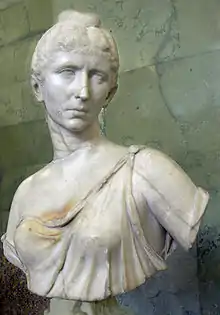Cornelia Salonina
Julia Cornelia Salonina (died 268, Mediolanum) was an Augusta of the Roman Empire, married to Roman Emperor Gallienus and mother of Valerian II, Saloninus, and Marinianus.
| Cornelia Salonina | |||||||||
|---|---|---|---|---|---|---|---|---|---|
| Augusta | |||||||||
 Marble bust of Cornelia Salonina | |||||||||
| Empress of the Roman Empire | |||||||||
| Tenure | 253 – 268 | ||||||||
| Born | Possibly Bithynia | ||||||||
| Died | 268 Mediolanum, Italia | ||||||||
| Spouse | Gallienus | ||||||||
| Issue | Valerianus Saloninus Marinianus | ||||||||
| |||||||||
| Dynasty | Valerian | ||||||||
| Religion | Roman Paganism | ||||||||
Life

Julia Cornelia Salonina's origin is unknown. One modern theory is that she was born of Greek origin[1][2][3] in Bithynia, then part of the province of Bithynia et Pontus, Asia Minor. However, there exists some scepticism on that.[4] She married Gallienus about ten years before his accession to the throne. When her husband became joint-emperor with his father Valerian in 253, Cornelia Salonina was named Augusta.
Cornelia was the mother of three princes, Valerian II, Saloninus and Marinianus.[5] Her fate after Gallienus was murdered during the siege of Mediolanum in 268 is unknown. One theory is that her life was spared;[6] another is that she was executed together with other members of her family, at the orders of the Senate of Rome.[7]
Her name is reported on coins with Latin legend as Cornelia Salonina; however, from the Greek coinage come the names Iulia Cornelia Salonina, Publia Licinia Cornelia Salonina, and Salonina Chrysogona (attribute that means "begotten of gold").
References
- Bray (1997), pp. 30, 347. Supporters of Greek Bithynian origin include Andreas Alföldi in "Die Vorherrschaft der Pannonier im Römerreiche und die Reaktion des Hellenentums unter Gallienus", Studien zur Geschichte der Weltkrise des 3, Jahrhunderts nach Christus. M.78 Taf. Darmstadt, 1967; and R. Munsterburg in Numismatische Zeitschrift, vol. LVIII (1925), p. 41
- Lissner, Ivar (1958). The Caesars: might and madness. Putnam. p. 291. OCLC 403811.
Gallienus' wife was a remarkably sensitive and cultured Greek woman named Cornelia Salonina who came from Bithynia
- Bengtson, Hermann – Bloedow, Edmund Frederick (1988). History of Greece: from the beginnings to the Byzantine era. University of Ottawa Press. p. 344. ISBN 0-7766-0210-1.
The Empress Salonina, a Greek from Bithynia, took an avid part in the philhellenic efforts of the emperor.
CS1 maint: multiple names: authors list (link) - Bray (1997), p. 30, who cites Jean Gagé, Programme d' italicité et nostalgies d'hellénisme autour de Gallien et Salonine, Aufstieg und niedergang der Römischen Welt, vol. 5, New York, 1975, ISBN 3-11-004971-6, p. 839
- Bray (1997), pp. 50-51
- Bray (1997), p. 308
- Alaric Watson, Aurelian and the Third Century, (Oxford: Routledge, 1999) ISBN 0-415-30187-4, p. 41
Bibliography
- Bray, John. Gallienus : A Study in Reformist and Sexual Politics, Wakefield Press, Kent Town, 1997, ISBN 1-86254-337-2
- "Salonina", Dictionary of Greek and Roman Antiquities, edited William Smith (1870).
- Partial Salonina coinage
- "Dictionary of Roman Coins", by Seth William Stevenson (1889).
Further reading
- (in French) Minaud, Gérard, Les vies de 12 femmes d’empereur romain - Devoirs, Intrigues & Voluptés , Paris, L’Harmattan, 2012, ch. 11, La vie de Cornélia Salonina, femme de Gallien, p. 263-284.
External links
![]() Media related to Salonina at Wikimedia Commons
Media related to Salonina at Wikimedia Commons
| Royal titles | ||
|---|---|---|
| Preceded by Cornelia Supera |
Empress of Rome 253–268 |
Succeeded by Ulpia Severa |
| Preceded by Herennia Etruscilla |
Empress-Mother of Rome 260 |
Succeeded by Eutropia |